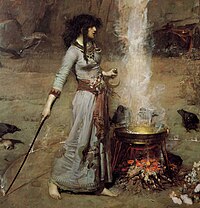
| Part of a series on |
| Witchcraft |
|---|
 |
In Africa, witchcraft refers to various beliefs and practices. These beliefs often play a significant role in shaping social dynamics and can influence how communities address challenges and seek spiritual assistance. Much of what "witchcraft" represents in Africa has been susceptible to misunderstandings and confusion, due to a tendency among western scholars to approach the subject through a comparative lens vis-a-vis European witchcraft.[1] The definition of "witchcraft" can differ between Africans and Europeans which causes misunderstandings of African conjure practices among Europeans.[2] For example, the Maka people of Cameroon believe in an occult force known as djambe, that dwells inside a person. It is often translated as "witchcraft" or "sorcery", but it has a broader meaning that encompasses supernatural harm, healing and shapeshifting; this highlights the problem of using European terms for African concepts.[3]
While some 19th–20th century European colonialists tried to stamp out witch-hunting in Africa by introducing laws banning accusations of witchcraft, some former African colonies introduced laws banning witchcraft after they gained independence. This has produced an environment that encourages persecution of suspected witches.[4]
In the Central African Republic, hundreds of people are convicted of witchcraft yearly, with reports of violence against accused women.[5] The Democratic Republic of the Congo witnessed a disturbing trend of child witchcraft accusations in Kinshasa, leading to abuse and exorcisms supervised by self-styled pastors.[6] In Ghana, there are several "witch camps", where women accused of witchcraft can seek refuge, though the government plans to close them.[7]
In west Kenya, there have been cases of accused witches being burned to death in their homes by mobs.[8] Malawi faces a similar issue of child witchcraft accusations, with traditional healers and some Christian counterparts involved in exorcisms, causing abandonment and abuse of children.[9] In Nigeria, Pentecostal pastors have intertwined Christianity with witchcraft beliefs for profit, leading to the torture and killing of accused children.[10] Sierra Leone's Mende people see witchcraft convictions as beneficial, as the accused receive support and care from the community.[11] In Zulu culture, healers known as sangomas protect people from witchcraft and evil spirits through divination, rituals and mediumship.[12]
In parts of Africa, beliefs about illness being caused by witchcraft continue to fuel suspicion of modern medicine, with serious healthcare consequences.[13][14]
Historian Jacob Olupano writes about religion in Africa: "...African religions are not static traditions, but have responded to changes within their local communities and to fluxes caused by outside influences, and spread with diaspora and migration". The people central to African religions, "including medicine men and women, rainmakers, witches, magicians, and divine kings ... serve as authority figures and intermediaries between the social world and the cosmic realm".[15]
- ^ Okeja, Uchenna (2011). 'An African Context of the Belief in Witchcraft and Magic,' in Rational Magic. Fisher Imprints. ISBN 978-1848880610.[page needed]
- ^ Bachmann, Judith (2021). "African Witchcraft and Religion among the Yoruba: Translation as Demarcation Practice within a Global Religious History". Method & Theory in the Study of Religion. 33 (3–4): 381–409. doi:10.1163/15700682-12341522. Retrieved 12 April 2024.
- ^ Geschiere, Peter (1997). The Modernity of Witchcraft: Politics and the Occult in Postcolonial Africa. Translated by Peter Geschiere and Janet Roitman. University of Virginia Press. p. 13. ISBN 0813917034.
- ^ Igwe, Leo (September–October 2020). "Accused Witches Burned, Killed in Nigeria". Skeptical Inquirer. Amherst, New York: Center for Inquiry.
- ^ "The dangers of witchcraft". Archived from the original on 2010-03-12. Retrieved 2010-03-26.
- ^ "Kolwezi: Accused of witchcraft by parents and churches, children in the Democratic Republic of Congo are being rescued by Christian activists". Christianity Today. September 2009. Archived from the original on 2011-11-14. Retrieved 2011-10-14.
- ^ Whitaker, Kati (September 2012). "Ghana witch camps: Widows' lives in exile". BBC News. BBC. Archived from the original on October 20, 2018. Retrieved September 1, 2012.
- ^ Kanina, Wangui (2008-05-21). "Mob burns to death 11 Kenyan "witches"". Reuters. Archived from the original on 2017-06-20. Retrieved 2016-09-15.
- ^ Byrne, Carrie 2011. Hunting the vulnerable: Witchcraft and the law in Malawi; Consultancy Africa Intelligence (16 June):
- ^ "Stepping Stones Nigeria 2007. Supporting Victims of Witchcraft Abuse and Street Children in Nigeria". humantrafficking.org. Archived from the original on 2012-10-17.
- ^ West, Harry G. Ethnographic Sorcery (p. 24); 2007. The University of Chicago Press. ISBN 978-0226893983 (pbk.).
- ^ Cumes, David (2004). Africa in my bones. Claremont: New Africa Books. p. 14. ISBN 978-0-86486-556-4.
- ^ Kielburger, Craig; Kielburger, Marc (18 February 2008). "HIV in Africa: Distinguishing disease from witchcraft". Toronto Star. Toronto, Ontario: Toronto Star Newspapers Ltd. Archived from the original on 19 October 2017. Retrieved 18 September 2017.
- ^ "Ebola outbreak: 'Witchcraft' hampering treatment, says doctor". BBC News. London: BBC. 2 August 2014. Archived from the original on 18 July 2021. Retrieved 22 June 2018.
citing a doctor from Médecins Sans Frontières: 'A widespread belief in witchcraft is hampering efforts to halt the Ebola virus from spreading'
- ^ Olupano, Jacob (2014). African Religions: A Very Short Introduction. Oxford University Press. ISBN 9780199790586.